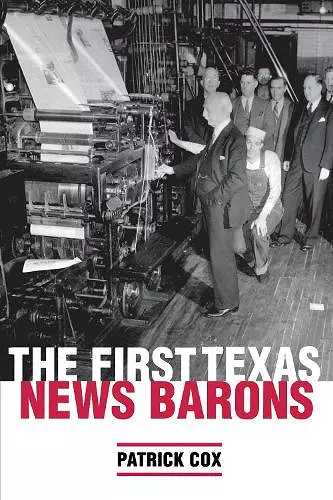The First Texas News Barons
Format:Paperback
Publisher:University of Texas Press
Published:1st Nov '05
Currently unavailable, and unfortunately no date known when it will be back

A fascinating look at how newspaper publishers including A. H. Belo and George B. Dealey (Dallas Morning News), William P. Hobby and Oveta Culp Hobby (Houston Post), Jesse H. Jones (Houston Chronicle), and Amon G. Carter Sr. (Fort Worth Star-Telegram) played a crucial role in transforming Texas into a modern state.
A fascinating look at how newspaper publishers including A. H. Belo and George B. Dealey (Dallas Morning News), William P. Hobby and Oveta Culp Hobby (Houston Post), Jesse H. Jones (Houston Chronicle), and Amon G. Carter Sr. (Fort Worth Star-Telegram) pla
Newspaper publishers played a crucial role in transforming Texas into a modern state. By promoting expanded industrialization and urbanization, as well as a more modern image of Texas as a southwestern, rather than southern, state, news barons in the early decades of the twentieth century laid the groundwork for the enormous economic growth and social changes that followed World War II. Yet their contribution to the modernization of Texas is largely unrecognized.
This book investigates how newspaper owners such as A. H. Belo and George B. Dealey of the Dallas Morning News, Edwin Kiest of the Dallas Times Herald, William P. Hobby and Oveta Culp Hobby of the Houston Post, Jesse H. Jones and Marcellus Foster of the Houston Chronicle, and Amon G. Carter Sr. of the Fort Worth Star-Telegram paved the way for the modern state of Texas. Patrick Cox explores how these news barons identified the needs of the state and set out to attract the private investors and public funding that would boost the state's civic and military infrastructure, oil and gas industries, real estate market, and agricultural production. He shows how newspaper owners used events such as the Texas Centennial to promote tourism and create a uniquely Texan identity for the state. To balance the record, Cox also demonstrates that the news barons downplayed the interests of significant groups of Texans, including minorities, the poor and underemployed, union members, and a majority of women.
Those interested in how power is used -- as well as who gets to wield it -- will enjoy this contribution to the study of journalism, often called the rough draft of history. * East Texas Historical Association *
ISBN: 9780292709775
Dimensions: unknown
Weight: 454g
288 pages